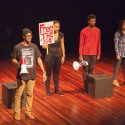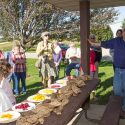Chancellor’s lecture launches Year of the Humanities
A lecture that delves into the songs and sexuality of ancient Greek drinking parties and a talk on the 1989 German revolution that brought down the Berlin Wall are just two events that will mark the Year of the Humanities on the University of Wisconsin–Madison campus.
Organized by the Arts and Humanities Strategic Planning Council, the programmers will make available the latest in humanities research and teaching to the campus and the general public through 20 ambitious lectures, panels, discussions and performances.
Philosophers, classicists, filmmakers, historians, poets, art historians, linguists and other scholars will come to campus to share the latest in what is new and exciting in humanities thought and research.
Why now? The 2009-10 academic year marks anniversary milestones for many humanities organizations on campus: 50th for the Institute for Research in the Humanities; 40th of the Gaylord Nelson Institute for Environmental Studies; 10th for the Center for the Humanities and the Visual Culture Studies Initiative; and fifth for the Language Institute.
The goal for the Year of the Humanities is to raise the profile of the humanities by showing what the humanities are and how they enrich our lives. Steven Nadler, chair of the Department of Philosophy and William H. Hay II Professor of Philosophy, is co-chair of the council, along with Susan Zaeske, chair of the Department of Communication Arts. Council members include representatives from arts and humanities departments in the College of Letters & Science, as well as from departments in the social sciences and in other schools doing work and research in the humanities, such as the School of Human Ecology and the College of Agricultural and Life Sciences.
The humanities encompass work that focuses on the history and products of human achievement, such as philosophy, music, art, literature, history and the history of science. Celebrating them provides a chance to reflect on and learn from human endeavors. “If we didn’t have the humanities, we’d have little to go on. Through the humanities, we understand where we came from and where we are going. We must investigate the past, both good and bad, our values, and our actions. We need to reflect and plan for what comes next,” says Nadler. “We need the humanities to help us think about our essential values, such as justice and equality.”
The first of two chancellor’s lectures, part of the Year of the Humanities, will do just that. Martha Nussbaum, Ernst Freund Distinguished Service Professor of law and ethics at the University of Chicago, will discuss “Not for Profit: Why Democracy Needs the Humanities,” at 7 p.m. on Monday, Sept. 14, at the Elvehjem Building, 800 University Ave.
“Nussbaum is a scholar of philosophy, ancient history, health care and the status of women in developing nations. There are not many intellectuals who can take their scholarship public and make it enjoyable. She is enormously popular and can frame history in a way that is interesting to a broad audience,” says Nadler.
The second chancellor’s lecture, to be held in April, will bring Elaine Pagels, professor of religion at Princeton University to campus. Other Year of the Humanities events for the fall semester include a discussion on the biology of perception and how visuality influences cognition (Sept. 17), a presentation on the songs and sexuality at ancient Greek drinking parties (Sept. 17), an exploration of Aldo Leopold as a writer (Nov. 17); and a performance of Chaucer’s “Canterbury Tales,” done rap style (Nov. 2). All events are free and open to the public.



